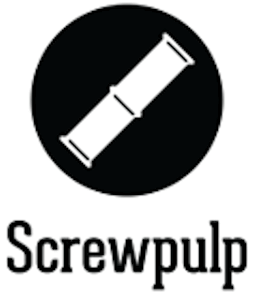 Thanks to Richard Billings, founder and CEO of Screwpulp, for this guest post!
Thanks to Richard Billings, founder and CEO of Screwpulp, for this guest post!
I read my first book when I was 3 years old. It was, of course, Green Eggs and Ham. I didn’t so much immerse myself in Seuss’ wonderful rhyming world as I read the words aloud, but with my parent’s deal of “learn to read this one and we’ll buy you another,” I quickly became enamored with books. Then my mom turned me loose on a encyclopedia series of children’s stories from around the world. I must have thumbed through those pages thousands of times, taking stops along the way to read The Emperor’s New Clothes and gaze at the magnificent illustrations.
I loved the school library and its pre-Google era, yellow tinted, vanilla scented information overload. I learned about topics from Custer’s Last Stand to Origami, and peeled back transparent plastic layers of the human body.
As I became more aware of just how beautiful a book could be I began to wonder: “Who spun these great tales?” I read the biographies of great writers and learned with much amazement that Mark was really Sam. I found that Edgar’s own fears and obsessions drove his stories and that many of these writers were more interesting than the characters they created.
I latched on to Stephen King, Clive Barker, and John Irving in my high school years and began to write and win school sponsored writing contests. In more recent years the writing bug returned. and I began to write poems and short stories. I posted them everywhere that I could and sat by the computer waiting for feedback. That feedback drove me to want to write my first novel. I hovered over the keyboard for the better part of two weeks. In the end I had two whole chapters. My reaction, “Wow, this stuff takes a long time.”
I decided that rather than spend the next year spilling my mind onto the page with no knowledge that anyone would read it that I had better do a little research.
I found that the traditional publishing method hasn’t changed in hundreds of years. An elite few have control over what we read. It’s not that they want to control what we read but rather that they have to hedge their bets on what they know has a proven track record of returning on their investments. Traditional publishers spend a lot of money on editing, cover design, vetting, printing, distribution, payrolls, and marketing. All of these things cost money that will eventually lead to the author receiving less than 25% of the final book sale.
Because of this near impossibility of being noticed by the traditional model I started to research self-publishing. I quickly became aware that although self-publishing offers more revenue from each book sale, and has basically no barrier to entry into the market, it has several problems of its own. As a reader I would browse the virtual shelves of self-published authors and would find a book with an interesting synopsis from an author I’d never heard of. The book would have no rating or review and would often be priced well above the level that I’m willing spend on a title with so many unknowns.
I began to look at marketing options for books and found that, even in this digital age, word-of-mouth is still, and possibly always will be, the best way to market a book. Within three years, and after much discussion with writers and readers, Screwpulp was born.
When a new book is published with Screwpulp there are no contracts to sign and no exclusivity. The author, after all, is the publisher. The book is placed in our marketplace with a $0 price. Readers can purchase this ‘free’ book in exchange for a simple social media mention (currently only Twitter with more to come). This social mention gets the conversation started and even allows for the author and readers to engage one another. It’s your first wave of marketing.
Readers are only allowed one ‘free’ book per day and if they return to get another ‘free’ book at a later date they are required to rate/review the previous book. After the initial ‘free’ copies (currently 25) are spoken for, the book’s price automatically rises in price to $1, but now it will have a star rating on which potential buyers can base their decision.
Highly rated books will continue to rise in price as the demand goes up. Lower rated books will stagnate and eventually fall through the cracks. This elegant solution gives clear indications to readers about the quality of the content and readers drive that content through their ratings.
For authors, it’s also an elegant option. Loading your book to Screwpulp requires no exclusivity. Authors receive 75% of all their book sales.
 Richard Billings is the CEO and founder of Screwpulp. He is an awarding winning wheelbarrow racer and self proclaimed tinkerer and geek. Thirteen-year consecutive winner of “The Worlds Greatest Dad” award as proclaimed by his two beautiful daughters.
Richard Billings is the CEO and founder of Screwpulp. He is an awarding winning wheelbarrow racer and self proclaimed tinkerer and geek. Thirteen-year consecutive winner of “The Worlds Greatest Dad” award as proclaimed by his two beautiful daughters.
Editor’s Note: If/when you give Screwpulp a shot, we’re interested in hearing about your results!

This sounds good to authors, but I wonder why readers would sign up. Thousands of books are available for free everyday with NO obligation whatsoever. And their are plenty of ways to gauge ratings of books. I’m not seeing the USP. Am I missing something?
Even if you are not in KDP Select, but have your book for sale on Amazon.com, I believe their webbots scour the web for pricing. If they find your book priced free or lower than their price, they will change the price on Amazon.com. So be aware. Unless I’m misunderstanding Amazon’s policy. Anyone know for sure?
That is true that Amazon could use the Screwpulp price to price your book accordingly on Amazon. I think it’ll be a while before Amazon takes notice. Strangely I used to work for a company that would scrape data from sites like Hotels.com and Priceline. Using this knowledge we’re not going to make it easy for pricing to be scraped from our site.
Interesting concept. I have two books that have done pretty well thus far and I am not sure if I have the right to place the e-books in this program. My books are currently with Amazon.com and Kindle. They are sold by many other companies that have to go through Amazon’s CreateSpace to obtain them. Though I set the price of the Kindle versions, and can opt to give them away, I still must allow CreateSpace to collect their fee portion. This means that if I give them away, I must pay them their commission fee. So in effect, I cannot give them away at no cost to myself.
Is it possible to offer my books with your organization under a separate cover? I might give such an arrangement some consideration and then deal more exclusively with Screwpulp as I publish future works. I have several books that may soon be ready for publication.
By the way, I don’t like the name of your company either. It does not conger up the image you seem to intend and would be deemed vulgarity by many. Myself included.
Hi Clifford – I’ll refer to the good folks at SP to answer most of this, but to my understanding Kindle and CreateSpace are separate and not sure why CreateSpace would collect a fee from ebook earnings when they’re the print division?
Sorry to get in on this so late. I’m not sure how CreateSpace works in regards to taking a portion even if they are offered a no charge. You are more than welcome to submit your work with a different cover on our site. As far as our name is concerned it actually tests very well with both readers and writers in general. As explained in one of the other comments it is a melding of Gutenberg’s Screw Press and Pulp (fiction/paper). At the very least seems to not be a major barrier as we have children books, business books and christian fiction books on our site currently.
Thanks!
Richard is a great guy. Currently working with him to get out a serial novel series I’ve been writing. If you are curious you should give them a shot.
Thanks for weighing in, Lee!
This would create problems with other distributors where books are already priced.
Indeed it may… But if a person is self-publishing, it’s an option to launch with – get some early attention, then move it to KDP, get some attention there, and so on… It will be interesting how this all shakes out…
I love the idea and the look of the site. Even the covers are classy. But I really think “Screwpulp” as a name might have been a bad marketing choice. Time will tell, I guess. : )
One other reader has had misgivings about the name, too. According to the company: “We get asked this question a lot, so let us explain. The screw press was the first printing method that allowed for books to be made with moveable type in mass. Now that we’re in the digital age, the move away from paper, or pulp, is becoming the new normal. A merging of these two ideas led us to the name we have today, Screwpulp.” Yep – guess time will tell!
Hmmm interesting concept. Anybody out there tried them? Unfortunately, I can’t control, my pricing (sigh) so I can’t engage in the freebie offer.
I like the sound of this publisher. I have found that Self Publishing is a full time job and you have to be very computer savvy. If we decide to look into a publisher for “Rainbow’s End”, we would certainly get in touch with Screwpulp.
JB Bonds
Actually once your KDP exclusive runs out you could give ’em a try – it’s non-exclusive…